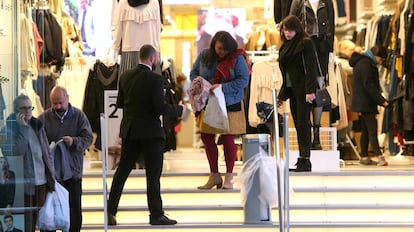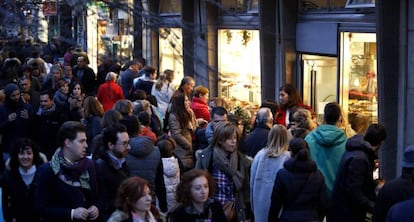Spanish brands bank on early sales to make up for slow fall season
Traditional January sales period is giving way to permanent discounts that eat into profit margins

Spain’s traditional sales campaign, which used to begin on January 7 – the day after many Spanish children receive their presents from the Three Kings – has lost ground in the face of year-round discounts and a surge in online shopping . This growing trend is particularly visible during Black Friday, when nearly a third of all Christmas shopping gets done, according to a report by the consulting giant Deloitte.
All the main fashion brands, including Mango, H&M, Cortefiel, Women’s Secret, Bimba y Lola and Sfera; large department stores such as El Corte Inglés, and the online retail giant Amazon are already offering early sales with discounts of up to 70% in some cases.
The sales calendar is now being set by online shopping, especially around Black Friday
Emilio González, Icade business school
The tendency towards year-round sales is having a negative impact on small and medium firms in the textile industry, as reduced prices eat into their profit margins. The Spanish Commerce Confederation (CEC) has insisted once more on the need to establish a well-defined sales period.
“Early sales by many commercial brands has forced small and medium stores to do the same, as a way to get rid of their extensive excess stock,” said the CEC in a statement. The surplus inventory is the result of a slow fall–winter sales season.
Despite the general tendency to jump the gun on sales season, Inditex – the parent company of Zara and other major fashion brands – continues to wait until after January 6 before putting up its sales signs. Meanwhile, El Corte Inglés has taken a middle-of-the-road approach: some items are already 40% off their regular price, but the bulk of the offers will come after the January 6 Día de Reyes.

At the other end of the spectrum, fashion brands Mango, H&M, Women’s Secret and Bimba y Lola are already offering large discounts for online and physical shopping.
“The sales calendar is now being set by online shopping, especially around Black Friday,” explains Emilio González, who teaches economics at the Madrid-based business school Icade. “Consumers take advantage of these offers to do their Christmas shopping, and businesses are offering more promotional prices in order to adapt and defend their sales.”
Sales: good or bad?
Despite the back-to-back discounts, businesses remain hopeful that the Christmas and official sales season will yield positive numbers, even if profit margins take a hit.
“This is our key campaign, it is still our great sales bastion. January sales are our biggest discount period at El Corte Inglés,” said a company spokesperson.
The textile business association Acotex said it is expecting to see sales growth of between 5% and 10%, but described it as a bad thing.
“There are going to be very good sales with a lot of products available, which is bad because it’s going to eat into companies’ profit margins,” said Acotex president Eduardo Zamácola.
English version by Susana Urra.
Tu suscripción se está usando en otro dispositivo
¿Quieres añadir otro usuario a tu suscripción?
Si continúas leyendo en este dispositivo, no se podrá leer en el otro.
FlechaTu suscripción se está usando en otro dispositivo y solo puedes acceder a EL PAÍS desde un dispositivo a la vez.
Si quieres compartir tu cuenta, cambia tu suscripción a la modalidad Premium, así podrás añadir otro usuario. Cada uno accederá con su propia cuenta de email, lo que os permitirá personalizar vuestra experiencia en EL PAÍS.
¿Tienes una suscripción de empresa? Accede aquí para contratar más cuentas.
En el caso de no saber quién está usando tu cuenta, te recomendamos cambiar tu contraseña aquí.
Si decides continuar compartiendo tu cuenta, este mensaje se mostrará en tu dispositivo y en el de la otra persona que está usando tu cuenta de forma indefinida, afectando a tu experiencia de lectura. Puedes consultar aquí los términos y condiciones de la suscripción digital.









































